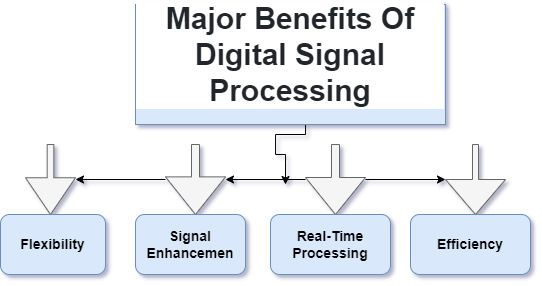In this digital world, signals that keep us connected are all around us. But have you ever wondered how we make sense of them? That’s where ‘Digital Signal Processing (DSP)’ comes into play.
It’s like a magical tool that uses math and computers to analyze and improve signals, and It’s what makes your favourite songs sound better and lets you talk to voice assistants.
In this article, we’ll dive into the world of DSP, learn its basics, and discover the amazing things it can do in our everyday lives.
Get ready to unlock the secrets of Digital Signal Processing and its cool applications!
What Is Digital Signal Processing?
Digital Signal Processing (DSP) is an amazing field that uses advanced math and computers to understand and improve signals. Signals are everywhere in our digital world, like music, pictures, and wireless communication.
Imagine listening to music with headphones: DSP algorithms can remove all the unwanted background noise, making the sound much better and giving you an immersive experience while listening on your favorite headphones, earphones, and AirPods.

Not only that, but DSP also helps make pictures and videos look better by reducing fuzziness and making them clearer. Moreover, in wireless communication, Digital Signal Processing makes signals stronger and helps data travel faster.
Using math and computer science, Digital Signal Processing makes a big difference in entertainment, communication, and science, making our experiences with sound and visuals even more awesome!
How Does It Work?
Digital signal processing (DSP) uses math to analyze and change digital signals. First, analogue signals become digital through sampling and quantization. Then, we use special tools to apply operations such as filtering, convolution, Fourier transforms, modulation, and coding.
DSP improves signal quality, extracts information, remove noise, and compresses data. Moreover, if necessary, you can convert the processed signal back to its analogue form for further utilization or better human understanding.
Need more clarity? Don’t worry: Let’s dive deep and learn more about Digital Signal Processing in detail. As you read on, you’ll understand it better.
What are the Fundamentals Of Digital Signal Processing?
The Fundamentals of Digital Signal Processing (DSP) involve essential concepts that help us understand and manipulate signals:
- Sampling: This is like taking snapshots of a continuous signal at regular intervals to create a digital version. It’s similar to capturing moments in a video to make individual frames.
- Quantization: It’s like assigning digital values to the measured analogue signal. Think of it as grouping the possible values into a finite set, just like rounding a number to the nearest whole number.
- Discrete Fourier Transform (DFT): This mathematical technique converts a discrete-time signal into its frequency domain representation. Also, it helps us understand the different frequencies present in a signal.
- Fast Fourier Transform (FFT): It’s an efficient algorithm that performs the DFT quickly. Moreover, it’s like a supercharged version of the DFT that helps us analyze signals faster and more effectively.
In summary, these fundamentals form the backbone of Digital Signal Processing, enabling us to analyze, manipulate, and extract valuable information from digital signals.
What are the Key Concepts Of Digital Signal Processing?
The key concepts of Digital Signal Processing (DSP) encompass fundamental ideas that are crucial for signal manipulation and enhancement. Let’s take a look.
- Filters: These are special algorithms that allow us to modify or extract specific frequency components from a signal. Moreover, it’s like using a tool to separate different colours from a picture, focusing on the ones we want.
- Convolution: It’s a mathematical operation where two signals interact, resulting in a third signal that represents their combined effect. Also, it’s similar to mixing different ingredients together to create a new flavour.
- Modulation: This concept involves encoding information onto a carrier signal, making it efficient for transmission over a communication channel. It’s like putting a message in a special code to send it securely.
- Noise Reduction: These are techniques used to remove or reduce unwanted noise from a signal. It’s like using a noise-cancelling feature to eliminate background sounds and focuses on the important audio.
In summary, understanding these key concepts in DSP empowers us to manipulate signals effectively, extract desired information, and improve the quality of audio, images, and data transmission.
What are the Top 5 Applications Of Digital Signal Processing?
- Audio Signal Processing: DSP is widely used in audio systems for tasks such as audio compression, equalization, and noise cancellation.
- Speech Processing: DSP algorithms are applied to speech signals for tasks like speech recognition, synthesis, and enhancement.

- Voice Processing: DSP plays a crucial role in voice-based applications such as voice assistants, voice-controlled systems, and voice communication.
- Artificial Intelligence: DSP is integrated with AI algorithms to process audio and other sensor data for applications like voice recognition, natural language processing, and audio-based AI systems.

- RADAR: DSP is extensively used in RADAR systems for signal-processing tasks such as target detection, range estimation, and tracking.
What are the Major Benefits Of Digital Signal Processing?
Digital Signal Processing (DSP) offers several major benefits that contribute to its widespread use. Let’s explore them:

- Signal Enhancement: DSP algorithms can make signals better. They can reduce unwanted noise, enhance important details, and improve the overall quality of signals. Also, it’s like using a special filter to make a picture look clearer.
- Flexibility: DSP allows us to easily change and adjust algorithms to fit different signal processing needs. Moreover, it’s like having a toolbox with various tools that we can use for different tasks.
- Real-Time Processing: DSP can quickly process signals in real-time, meaning it can analyze and manipulate signals as they happen. In addition, this is important for applications that require immediate responses, like video games or live audio processing.
- Efficiency: DSP techniques are designed to make the most efficient use of computing resources. In addition, they can perform complex calculations using less memory and processing power, making them efficient and effective.
Why does Digital Signal Processors matter?
Digital Signal Processors (DSPs) perform digital signal processing tasks efficiently due to their specialized microprocessor design. Moreover, they play a crucial role in various domains, including telecommunications, audio processing, image and video processing, radar systems, control systems, and more.
Here are several reasons why DSPs matter:
- Efficient signal processing: DSPs are like super-fast calculators that process sounds, images, and other signals quickly and accurately.
- Specialized architecture: DSPs are designed specifically for tasks like making sounds clearer, removing noise, and improving picture quality.
- Real-time processing: DSPs work really fast, which is important for things like live video chats and streaming music or videos without delays.
- Power efficiency: DSPs are designed to use less energy while still doing their job well, which is useful for devices that run on batteries.
- Versatility: DSPs can be programmed to do different tasks, so they can adapt and work with new technologies and improve over time.
- System integration: DSPs can do many things on their own, like converting signals from analogue to digital and vice versa, which helps make devices smaller and cheaper.
- Performance optimization: DSPs have tricks and shortcuts built into them to make signal processing faster and more efficient.
- Wide application range: DSPs are used in things like cell phones, Wi-Fi, music players, video games, medical devices, cars, and more, making them important in many different areas of technology.
- AI processing: DSPs play a crucial role in accelerating AI algorithms. Moreover, they can efficiently handle the computational demands of tasks like speech recognition, natural language processing, computer vision, and deep learning. Similarly, DSPs enable AI-powered applications and devices to perform tasks quickly and accurately, enhancing user experiences and enabling new capabilities like robotics, virtual assistants, and autonomous systems.
Frequently Asked Questions
What is digital signal processing?
Digital signal processing (DSP) is a set of techniques to make digital communications more accurate and reliable. Also, it works by clarifying or standardizing the levels or states of a digital signal.
What are the applications of digital signal processing?
Various fields such as acoustics, structural testing, video processing, geophysics, automotive and aerospace engineering, energy, medical imaging, RADAR, SONAR, and LIDAR utilize digital signal processing.
Where do people mainly use digital signal processors?
Embedded digital signal processors find applications in various consumer products, including mobile phones, fax/modems, disk drives, radios, printers, medical and healthcare devices, MP3 players, high-definition televisions (HDTV), and digital cameras.
End Note
In conclusion, Digital Signal Processors (DSPs) are the secret powerhouses behind our favourite devices, making them work faster, smarter, and more awesome.
ThinkPalm Technologie’s extensive expertise and top-notch AI services make it possible to unleash the full potential of Artificial Intelligence, creating mind-blowing technology experiences for you.
Moreover, our mission is to transform your wildest tech dreams into a breathtaking reality. We dedicate ourselves to making the seemingly impossible possible by leveraging our expertise and cutting-edge technologies. In addition, with us by your side, get ready to witness your most ambitious visions manifest into extraordinary technological achievements.
So, are you ready to witness the AI wizardry of ThinkPalm? Connect with our AI experts today and experience the exceptional AI development services that’ll enable you to leverage the endless possibilities of AI.
Contact us today to book a FREE consultation with one of our AI Experts.
Author Bio
Vishnu Narayan is a dedicated content writer and a skilled copywriter working at ThinkPalm Technologies. More than a passionate writer, he is a tech enthusiast and an avid reader who seamlessly blends creativity with technical expertise. A wanderer at heart, he tries to roam the world with a heart that longs to watch more sunsets than Netflix!




